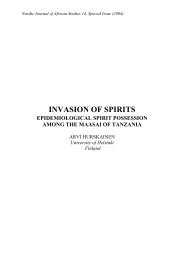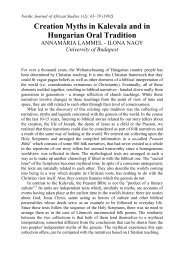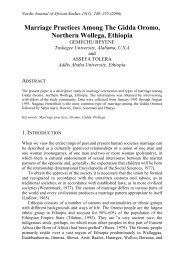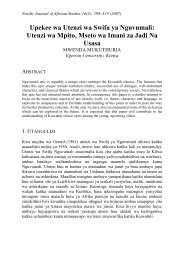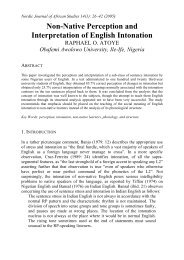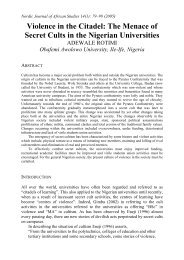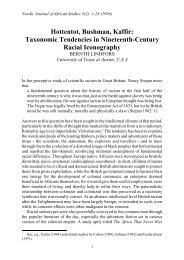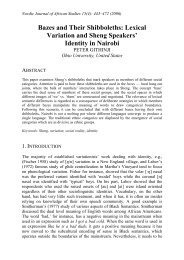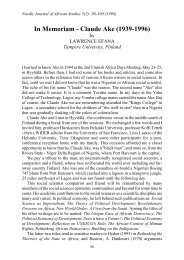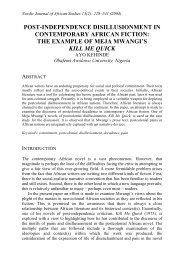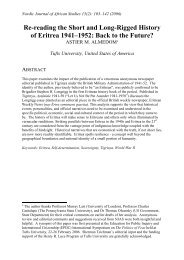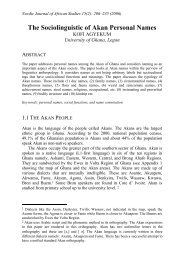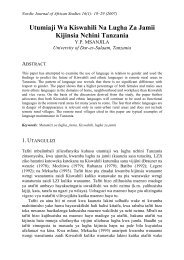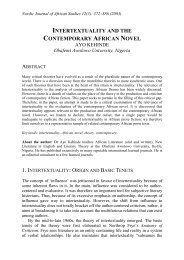Pressure Groups and the Democratic Process in Nigeria (1979-1993)
Pressure Groups and the Democratic Process in Nigeria (1979-1993)
Pressure Groups and the Democratic Process in Nigeria (1979-1993)
Create successful ePaper yourself
Turn your PDF publications into a flip-book with our unique Google optimized e-Paper software.
Nordic Journal of African Studies 11(1): 38-47 (2002)<br />
<strong>Pressure</strong> <strong>Groups</strong> <strong>and</strong> <strong>the</strong> <strong>Democratic</strong> <strong>Process</strong><br />
<strong>in</strong> <strong>Nigeria</strong> (<strong>1979</strong>-<strong>1993</strong>)<br />
ADESOJI ABIMBOLA<br />
Obafemi Awolowo University, <strong>Nigeria</strong><br />
ABSTRACT<br />
This paper exam<strong>in</strong>es <strong>the</strong> contributions made by pressure groups to <strong>the</strong> democratic process <strong>in</strong><br />
<strong>Nigeria</strong>. The paper attempts a conceptualization of pressure groups <strong>and</strong> democracy. It also<br />
exam<strong>in</strong>es <strong>the</strong> relevance of pressure groups generally, as well as <strong>the</strong>ir attitude to <strong>and</strong><br />
participation <strong>in</strong> <strong>the</strong> democratic process <strong>in</strong> particular. The specific contributions of <strong>the</strong>se<br />
groups to <strong>the</strong> democratic process as well as obstacles to <strong>the</strong>ir effectiveness are discussed. The<br />
paper concludes by advocat<strong>in</strong>g <strong>the</strong> need for <strong>the</strong> groups to achieve a wider spread <strong>and</strong> to<br />
participate more actively <strong>in</strong> <strong>the</strong> democratic process as ways of becom<strong>in</strong>g more relevant <strong>in</strong> <strong>the</strong><br />
democratic process.<br />
Keywords: democracy, pressure groups, unions<br />
INTRODUCTION<br />
The term pressure group is used <strong>in</strong>terchangeably with such terms as <strong>in</strong>terest<br />
groups or organized <strong>in</strong>terests. Henry Ehrman (1972:468-488) def<strong>in</strong>es pressure<br />
groups as voluntary associations of <strong>in</strong>dividuals who b<strong>and</strong> toge<strong>the</strong>r for <strong>the</strong><br />
defence of a particular <strong>in</strong>terest. Interest <strong>in</strong> this sense is a conscious desire to<br />
have a public policy or <strong>the</strong> authoritative allocation of values, <strong>and</strong> to move <strong>in</strong> a<br />
particular, general or specific direction.<br />
The term pressure group is however loosely used here to <strong>in</strong>clude trade or<br />
<strong>in</strong>dustrial unions, professional associations <strong>and</strong> any o<strong>the</strong>r associations whose<br />
focus extends beyond <strong>the</strong> realization of <strong>the</strong> parochial <strong>in</strong>terests of <strong>the</strong>ir members.<br />
Barber (1975:198-199) categorized pressure groups generally <strong>in</strong>to two, namely<br />
defensive pressure groups <strong>and</strong> promotional pressure groups. While defensive<br />
pressure groups are basically concerned with <strong>the</strong> protection of <strong>the</strong>ir members’<br />
<strong>in</strong>terests <strong>and</strong> have a def<strong>in</strong>ed membership, promotional pressure groups are<br />
concerned with promot<strong>in</strong>g some general public <strong>in</strong>terest as opposed to <strong>the</strong>ir own<br />
self-<strong>in</strong>terest. Trade or <strong>in</strong>dustrial unions, professional associations <strong>and</strong> human<br />
rights associations <strong>the</strong>refore fall <strong>in</strong>to <strong>the</strong> category of promotional pressure<br />
groups, o<strong>the</strong>rwise referred to here as functional pressure groups.<br />
Accord<strong>in</strong>g to John <strong>and</strong> Erna Perry (1976:584-585), <strong>in</strong>terest groups or<br />
pressure groups are many <strong>and</strong> varied. Some are formally organized, o<strong>the</strong>rs are<br />
not. However, <strong>the</strong> more formally organized tend to be <strong>the</strong> more durable whereas<br />
those <strong>in</strong>formally organized usually dissolve after <strong>the</strong> crisis that orig<strong>in</strong>ated <strong>the</strong>m
<strong>Pressure</strong> <strong>Groups</strong> <strong>and</strong> <strong>Democratic</strong> <strong>Process</strong> <strong>in</strong> <strong>Nigeria</strong> (<strong>1979</strong>-<strong>1993</strong>)<br />
is resolved. The longevity or durability or <strong>the</strong>se groups, <strong>the</strong>ir consistency as well<br />
as <strong>the</strong>ir high sense of commitment to <strong>the</strong> realization of set goals all contribute to<br />
mak<strong>in</strong>g <strong>the</strong>m functional.<br />
Functional pressure groups can <strong>the</strong>refore be def<strong>in</strong>ed as those pressure or<br />
<strong>in</strong>terest groups whose activities are not limited or restricted to <strong>the</strong> promotion <strong>and</strong><br />
protection of parochial <strong>in</strong>terests but who are vocal <strong>and</strong> determ<strong>in</strong>ed <strong>in</strong> pursu<strong>in</strong>g<br />
policies <strong>and</strong> goals that have relevance to citizens <strong>in</strong> <strong>the</strong>ir own society. Viewed<br />
with<strong>in</strong> <strong>the</strong> context of political participation, such groups often criticize<br />
unpopular or unfavourable government policies, organized conferences,<br />
sem<strong>in</strong>ars, rallies, <strong>and</strong> even demonstrations or protest marches to express <strong>the</strong>ir<br />
displeasure <strong>and</strong>, <strong>in</strong> some cases, to suggest alternatives to programmes or policies<br />
which <strong>the</strong>y consider unfavourable. Functional groups work towards sensitiz<strong>in</strong>g<br />
<strong>and</strong> mobiliz<strong>in</strong>g <strong>the</strong> populace aga<strong>in</strong>st unpopular acts of government. In this<br />
respect, mention could be made of such groups as <strong>the</strong> <strong>Nigeria</strong>n Bar Association<br />
(NBA), <strong>Nigeria</strong>n Medical Association (NMA), <strong>Nigeria</strong>n Labour Congress<br />
(NLC), human rights organisations such as <strong>the</strong> Committee for <strong>the</strong> Defence of<br />
Human Rights (CDHR), as well as pro-democracy groups such as <strong>the</strong> Campaign<br />
for Democracy (CD), Academic Staff Union of Universities, (ASUU), National<br />
Association of <strong>Nigeria</strong>n Students, <strong>and</strong> <strong>the</strong> Press.<br />
Democracy as a concept has been def<strong>in</strong>ed <strong>in</strong> various ways <strong>and</strong> given various<br />
<strong>in</strong>terpretations. The generalized or loose nature of <strong>the</strong> concept would account for<br />
this. However, accord<strong>in</strong>g to Adey<strong>in</strong>ka Banwo (1997:40-50), <strong>the</strong> basic features of<br />
democracy which serve as a consensus among <strong>the</strong> contend<strong>in</strong>g perspectives on<br />
what democratic system ought to entail or manifest <strong>in</strong>clude <strong>the</strong> right to elections,<br />
a representative form of governance <strong>and</strong> freedom of choice, respect for <strong>the</strong> rule<br />
of law <strong>and</strong> equality before <strong>the</strong> law, accountability, <strong>the</strong> guarantee of <strong>the</strong> rights of<br />
<strong>in</strong>dividuals, an <strong>in</strong>dependent judiciary, as well as a decentralization or delegation<br />
of power <strong>and</strong> authority between all tiers of government.<br />
Obviously, functional pressure groups have contributed to <strong>the</strong> democratic<br />
process <strong>in</strong> <strong>Nigeria</strong> just as some may have contributed to <strong>the</strong> problem of<br />
democratization <strong>in</strong> <strong>Nigeria</strong>, ei<strong>the</strong>r overtly or covertly. In <strong>the</strong> view of Obasanjo<br />
<strong>and</strong> Mabogunje (1992:23), pressure groups are to a very large extent necessary<br />
<strong>and</strong> healthy for a thriv<strong>in</strong>g democratic culture to evolve. Obasanjo <strong>and</strong><br />
Mabogunje are, however, also of <strong>the</strong> op<strong>in</strong>ion that such groups must not be seen<br />
to be operat<strong>in</strong>g under <strong>the</strong> <strong>in</strong>fluence of foreign bodies. Moreover, <strong>the</strong> leadership<br />
under which <strong>the</strong>se groups operate some of <strong>the</strong> time, <strong>the</strong> prevail<strong>in</strong>g situation <strong>in</strong><br />
<strong>the</strong> country, <strong>the</strong> organizational structure of <strong>the</strong>se groups as well as <strong>the</strong> general<br />
mood of <strong>the</strong> society determ<strong>in</strong>e, to a very large extent, <strong>the</strong> effectiveness of <strong>the</strong>se<br />
groups <strong>and</strong> profoundly <strong>in</strong>fluence <strong>the</strong>ir contributions to <strong>the</strong> democratic process.<br />
39
Nordic Journal of African Studies<br />
1. RELEVANCE OF PRESSURE GROUPS<br />
<strong>Pressure</strong> groups are undoubtedly relevant <strong>in</strong> terms of <strong>the</strong> functions which <strong>the</strong>y<br />
perform. These functions, accord<strong>in</strong>g to Henry Ehrman (1972:488-490), <strong>in</strong>clude<br />
manag<strong>in</strong>g <strong>the</strong> flow of <strong>in</strong>fluence between government <strong>and</strong> <strong>the</strong> governed by<br />
participat<strong>in</strong>g <strong>in</strong> <strong>the</strong> political competition of a given system. Through this<br />
process, a government is able to ascerta<strong>in</strong> reactions to its policies. Even so,<br />
pressure groups do not seek responsibility for <strong>the</strong> direct management of<br />
government, but reflect <strong>the</strong> concerns of <strong>the</strong> society <strong>in</strong> which <strong>the</strong>y operate. They<br />
sometimes destroy an exist<strong>in</strong>g consensus as well as prepare for a new one. Their<br />
part <strong>in</strong> provid<strong>in</strong>g a balance between stability <strong>and</strong> change with<strong>in</strong> a governmental<br />
system rema<strong>in</strong>s important. <strong>Pressure</strong> groups not only articulate <strong>the</strong> dem<strong>and</strong>s of<br />
<strong>the</strong>ir potential or actual membership, <strong>the</strong>y also serve as outlets for <strong>the</strong> social<br />
energies of <strong>the</strong>ir members. Fur<strong>the</strong>rmore, through concrete <strong>and</strong> cont<strong>in</strong>uous group<br />
campaigns, <strong>the</strong> socialization of <strong>the</strong> citizen by pressure groups often proves more<br />
effective <strong>and</strong> last<strong>in</strong>g. In some cases, <strong>the</strong>y supplement <strong>the</strong> functions of political<br />
parties while <strong>the</strong>y also seek to meet conflict<strong>in</strong>g claims <strong>and</strong> provoke favourable<br />
government decisions (Ehrman 1972:490).<br />
The techniques frequently commonly employed by pressure groups to<br />
achieve <strong>the</strong>ir aims <strong>in</strong>clude campaigns, demonstrations or marches, <strong>and</strong> strikes.<br />
Specifically <strong>in</strong> <strong>Nigeria</strong>, pressure groups like <strong>the</strong> <strong>Nigeria</strong>n Labour Congress<br />
(NLC), <strong>Nigeria</strong>n Medical Association (NMA), as well as National Association<br />
of <strong>Nigeria</strong>n Students (NANS), have made <strong>the</strong>mselves relevant not only <strong>in</strong> terms<br />
of what <strong>the</strong>y have been able to achieve for <strong>the</strong>ir members but also for <strong>the</strong> larger<br />
society. The NLC, for <strong>in</strong>stance, successfully negotiated a new m<strong>in</strong>imum wage<br />
with <strong>the</strong> Shagari adm<strong>in</strong>istration <strong>in</strong> 1981 after an effective general strike.<br />
Similarly NMA has consistently been <strong>in</strong> <strong>the</strong> forefront of negotiat<strong>in</strong>g an<br />
exclusive <strong>and</strong> improved salary package for its members. In <strong>the</strong> same ve<strong>in</strong>, <strong>the</strong><br />
opposition to <strong>the</strong> implementation of Structural Adjustment Programme,<br />
spearheaded by NANS <strong>in</strong> 1989 led to <strong>the</strong> <strong>in</strong>troduction of SAP relief packages<br />
for <strong>Nigeria</strong>ns, particularly <strong>the</strong> work<strong>in</strong>g class.<br />
However, political developments <strong>in</strong> <strong>the</strong> country <strong>in</strong> <strong>the</strong> 1980s <strong>and</strong> early 1990s<br />
have not only toughened some pressure groups but have also resulted <strong>in</strong> <strong>the</strong><br />
emergence <strong>and</strong> growth of new ones. This development has led to <strong>the</strong> <strong>in</strong>creased<br />
<strong>in</strong>volvement of more assertive pressure groups <strong>in</strong> efforts to atta<strong>in</strong> <strong>and</strong> susta<strong>in</strong> a<br />
stable democratic order <strong>in</strong> <strong>the</strong> country.<br />
2. ATTITUDES TO AND PARTICIPATION IN THE NATIONAL<br />
DEMOCRATIC PROCESS<br />
The attitude of pressure groups to <strong>the</strong> democratic process <strong>and</strong> <strong>the</strong>ir participation<br />
<strong>in</strong> it depend to a very large extent on developments over a particular period <strong>and</strong><br />
<strong>the</strong> resultant conditions. Even before <strong>the</strong> atta<strong>in</strong>ment of political <strong>in</strong>dependence,<br />
40
<strong>Pressure</strong> <strong>Groups</strong> <strong>and</strong> <strong>Democratic</strong> <strong>Process</strong> <strong>in</strong> <strong>Nigeria</strong> (<strong>1979</strong>-<strong>1993</strong>)<br />
organized labour has had cause to participate <strong>in</strong> party politics, particularly with<br />
its affiliation to <strong>the</strong> National Council of <strong>Nigeria</strong> <strong>and</strong> <strong>the</strong> Cameroons (NCNC) <strong>in</strong><br />
1944. The outcome of this affiliation was <strong>the</strong> success of <strong>the</strong> general strike of<br />
1945. A similar situation came about <strong>in</strong> 1964 when workers not only dem<strong>and</strong>ed<br />
improved wages but also made a number of political dem<strong>and</strong>s. The climax of<br />
this development was <strong>the</strong> formation of <strong>the</strong> <strong>Nigeria</strong>n Labour Party by Michael<br />
Imoudu <strong>and</strong> Eskor Toyo <strong>in</strong> 1964. Even though <strong>the</strong> party did not have much<br />
follow<strong>in</strong>g, ow<strong>in</strong>g to <strong>the</strong> regional nature of political parties formed dur<strong>in</strong>g <strong>the</strong><br />
period, it none<strong>the</strong>less participated <strong>in</strong> <strong>the</strong> controversial elections of 1964<br />
(Olukoju 1997:337-350).<br />
Despite <strong>the</strong> decision of <strong>the</strong> <strong>Nigeria</strong>n Labour Congress that its leaders should<br />
be non-partisan <strong>in</strong> <strong>the</strong> emerg<strong>in</strong>g political process <strong>in</strong> <strong>1979</strong>, <strong>in</strong>dividual members<br />
<strong>and</strong> officers who were <strong>in</strong>terested <strong>in</strong> politics were allowed to participate freely <strong>in</strong><br />
<strong>the</strong> political process, even though <strong>the</strong>y did not receive overt corporate back<strong>in</strong>g<br />
from <strong>the</strong> congress. The decision to be non-partisan must have arisen out of <strong>the</strong><br />
need to protect <strong>the</strong> new-found freedom of <strong>the</strong> congress, particularly <strong>in</strong> <strong>the</strong> face<br />
of <strong>the</strong> tower<strong>in</strong>g military presence <strong>in</strong> <strong>the</strong> Obasanjo adm<strong>in</strong>istration. Consequently,<br />
many labour leaders contested <strong>and</strong> won election to various offices under <strong>the</strong><br />
auspices of different political parties. This development notwithst<strong>and</strong><strong>in</strong>g, moves<br />
were made to pursue anti-labour policies <strong>and</strong> to <strong>in</strong>troduce anti-labour legislation,<br />
though without any success.<br />
As a result of <strong>the</strong> failure to get <strong>the</strong> <strong>Nigeria</strong>n Labour Party registered <strong>in</strong> 1989,<br />
<strong>the</strong> NLC was <strong>in</strong>volved <strong>in</strong> an unpr<strong>in</strong>cipled <strong>and</strong> <strong>in</strong>coherent affiliation <strong>and</strong> romance<br />
with <strong>the</strong> Social <strong>Democratic</strong> Party. This affiliation, which probably arose from a<br />
desire to realize <strong>the</strong> selfish ambition of Pascal Bafyau, <strong>the</strong> one-time President of<br />
<strong>the</strong> NLC <strong>and</strong> several labour leaders, did not benefit organized labour <strong>in</strong> any way<br />
<strong>and</strong> even contributed to a reversal of <strong>the</strong> political ga<strong>in</strong>s made by organized<br />
labour <strong>in</strong> <strong>the</strong> recent past. In contrast, however, articulate <strong>and</strong> determ<strong>in</strong>ed labour<br />
leaders like Frank Ovie Kokori <strong>and</strong> Milton Dabibi emerged dur<strong>in</strong>g this period,<br />
not only to restore credibility to trade unions but also to prove that “<strong>the</strong><br />
economic power of labour could be used as a barga<strong>in</strong><strong>in</strong>g weapon <strong>in</strong> <strong>the</strong> political<br />
arena”. (Olukoju 1997:348) Specifically, Kokori <strong>and</strong> Dabibi strongly believe<br />
that <strong>the</strong> NUPENG was able to use <strong>the</strong> strike option to pressure <strong>the</strong> military to<br />
reverse its unjust annulment of <strong>the</strong> presidential election of June 12, <strong>1993</strong>.<br />
Generally speak<strong>in</strong>g, <strong>the</strong>refore, organized labour, whe<strong>the</strong>r <strong>in</strong> <strong>the</strong> form of <strong>the</strong><br />
unions or as <strong>in</strong>dividuals with<strong>in</strong> <strong>the</strong> unions, has a tendency to participate <strong>in</strong> <strong>the</strong><br />
democratic process by contest<strong>in</strong>g elections, support<strong>in</strong>g c<strong>and</strong>idates for election or<br />
identify<strong>in</strong>g with a party or parties with a similar ideology <strong>and</strong> orientation<br />
(Olukoju 1997:337-350).<br />
The genesis of explicit human rights activities can be traced to 1987, when<br />
<strong>the</strong> Civil Liberties Organisation (CLO) was formed. From 1987 onwards, a<br />
stagger<strong>in</strong>g number of human rights organisations had been formed as Non-<br />
Governmental Organizations. These <strong>in</strong>cluded <strong>the</strong> Committee for <strong>the</strong> Defence of<br />
Human Rights (CDHR), formed <strong>in</strong> 1989, <strong>the</strong> Constitutional Right Project<br />
(CRP), <strong>the</strong> Universal Defenders of Democracy (UDD), <strong>the</strong> National Association<br />
41
Nordic Journal of African Studies<br />
of <strong>Democratic</strong> Lawyers (NADL), <strong>and</strong> <strong>the</strong> Human Right Africa, all formed after<br />
<strong>the</strong> abortive coup d’etat of April 1990. Traditionally, <strong>the</strong>se human rights<br />
organisations have been ma<strong>in</strong>ly <strong>in</strong>volved <strong>in</strong> <strong>the</strong> campaign to protect human<br />
rights, highlight<strong>in</strong>g <strong>the</strong> <strong>in</strong>cidence of human rights abuses, <strong>and</strong> seek<strong>in</strong>g redress or<br />
restitution for victims of such abuses, ma<strong>in</strong>ly through <strong>the</strong> due process of law.<br />
However <strong>the</strong> emergence of <strong>the</strong> dictatorial tendencies of <strong>the</strong> Babangida<br />
adm<strong>in</strong>istration <strong>and</strong> <strong>the</strong> manipulation of <strong>the</strong> democratic process led to a radical<br />
transformation of <strong>the</strong>se HROs <strong>and</strong> <strong>the</strong> manifestation of a greater <strong>in</strong>terest <strong>in</strong><br />
political matters per se. The climax of this development was <strong>the</strong> emergence <strong>in</strong><br />
November 1991 of <strong>the</strong> Campaign for Democracy as an umbrella organization<br />
for all HROs <strong>and</strong> pro-democracy groups. The CD sought to pursue strictly<br />
political questions left unattended to by most of its constituent member-groups<br />
<strong>and</strong> o<strong>the</strong>r democratic agencies. Its struggle centred around two ma<strong>in</strong> issues,<br />
namely: (1) <strong>in</strong>creas<strong>in</strong>g pressure on <strong>the</strong> Babangida junta to keep to its h<strong>and</strong>-over<br />
date of January 2, <strong>1993</strong>, which was eventually shifted to August 27, <strong>1993</strong>; (2)<br />
<strong>the</strong> campaign to convene a Sovereign National Conference, SNO, where <strong>the</strong><br />
national question could be discussed <strong>and</strong> <strong>the</strong> foundations of a new <strong>Nigeria</strong> laid.<br />
Beyond <strong>the</strong>se issues, <strong>the</strong> CD was <strong>the</strong> mobiliz<strong>in</strong>g force <strong>in</strong> <strong>the</strong> protest aga<strong>in</strong>st <strong>the</strong><br />
annulment of <strong>the</strong> June 12 election results. The political commitment of <strong>the</strong> CD<br />
was fur<strong>the</strong>r clarified by its declaration that:<br />
although it is not a political platform <strong>the</strong> CD has a political <strong>in</strong>terest that<br />
rests on <strong>the</strong> restoration of democracy <strong>and</strong> <strong>the</strong> transformation of <strong>Nigeria</strong>n<br />
society, hence <strong>the</strong> CD shall set up a political commission to draw up a<br />
m<strong>in</strong>imum politico-economic programme (Mimiko 1995:155).<br />
The major preoccupation of <strong>the</strong> Academic Staff Union of Universities, ASUU,<br />
has been with pressuriz<strong>in</strong>g <strong>the</strong> government <strong>in</strong>to ensur<strong>in</strong>g <strong>the</strong> adequate fund<strong>in</strong>g of<br />
research <strong>and</strong> accommodation for students, <strong>the</strong> ma<strong>in</strong>tenance or safeguard<strong>in</strong>g of<br />
university autonomy, <strong>and</strong> improvement <strong>in</strong> salaries. The ASUU has never<strong>the</strong>less<br />
had cause to become <strong>in</strong>volved <strong>in</strong> covert political activities. The progressive<br />
nature of <strong>the</strong> ASUU has probably accounted for this. The glorious era of <strong>the</strong><br />
ASUU was witnessed dur<strong>in</strong>g <strong>the</strong> tenure of Dr. Attahiru Jega, <strong>and</strong> later that of<br />
Dr. Asisi Asobie. It could be <strong>in</strong>ferred that <strong>the</strong> strike action embarked on by <strong>the</strong><br />
ASUU between May <strong>and</strong> November <strong>1993</strong>, even though it was primarily due to<br />
<strong>the</strong> unwill<strong>in</strong>gness of <strong>the</strong> government to honour its 1992 agreement with <strong>the</strong><br />
union, smacked of political <strong>in</strong>volvement on <strong>the</strong> part of <strong>the</strong> ASUU. This was<br />
clearly manifested <strong>in</strong> <strong>the</strong> dem<strong>and</strong> made by <strong>the</strong> union for <strong>the</strong> revalidation of <strong>the</strong><br />
annulled elections of June 12, <strong>1993</strong> by <strong>the</strong> Babangida regime (Ak<strong>in</strong>yanju<br />
1997:65-73). In <strong>the</strong> same ve<strong>in</strong>, <strong>the</strong> <strong>Nigeria</strong>n Bar Association (NBA) <strong>and</strong> <strong>the</strong><br />
<strong>Nigeria</strong>n Medical Association (NMA) had actively associated <strong>the</strong>mselves with<br />
<strong>the</strong> ma<strong>in</strong>tenance of democratic pr<strong>in</strong>ciples <strong>in</strong> <strong>Nigeria</strong>. The NBA has not only<br />
consistently advocated <strong>the</strong> <strong>in</strong>dependence of <strong>the</strong> judiciary but has also advocated<br />
respect for <strong>the</strong> rule of law <strong>and</strong> equality before <strong>the</strong> law, all of which constitute <strong>the</strong><br />
bedrock of democracy. The grow<strong>in</strong>g radical <strong>in</strong>cl<strong>in</strong>ation of <strong>the</strong> NBA particularly<br />
under Alao Aka-Bashorun <strong>and</strong> Mrs. Priscilla Kuye eventually made <strong>the</strong> Bar<br />
42
<strong>Pressure</strong> <strong>Groups</strong> <strong>and</strong> <strong>Democratic</strong> <strong>Process</strong> <strong>in</strong> <strong>Nigeria</strong> (<strong>1979</strong>-<strong>1993</strong>)<br />
Association a target of attack on <strong>the</strong> part of <strong>the</strong> adventurous military regime of<br />
Ibrahim Babangida. The outcome was <strong>the</strong> comatose state of <strong>the</strong> NBA from 1992<br />
to 1995. (Mimiko 1995:150-166).<br />
Under <strong>the</strong> auspices of <strong>the</strong> National Union of <strong>Nigeria</strong>n Students (NUNS) <strong>and</strong><br />
later <strong>the</strong> National Association of <strong>Nigeria</strong>n Students (NANS), <strong>Nigeria</strong>n students<br />
have not only displayed a positive attitude to <strong>the</strong> democratic struggle but have<br />
been fully <strong>in</strong>volved <strong>in</strong> it s<strong>in</strong>ce <strong>the</strong> 1960s. The repudiation of <strong>the</strong> Anglo-<strong>Nigeria</strong>n<br />
defence pact of 1962 owed a lot to <strong>the</strong> struggle waged by students. The<br />
philosophical basis of <strong>the</strong> students’ democratic struggle is conta<strong>in</strong>ed <strong>in</strong> <strong>the</strong><br />
Charter of Dem<strong>and</strong>s of <strong>the</strong> National Association of <strong>Nigeria</strong>n Students, which<br />
focuses on <strong>the</strong> revolutionary perspective that democracy is not possible unless<br />
<strong>the</strong> exploiter class is overthrown. The body has also constantly kicked aga<strong>in</strong>st<br />
<strong>the</strong> violation of <strong>the</strong> constitutional rights of <strong>the</strong> people while advocat<strong>in</strong>g <strong>the</strong><br />
restoration of popular democracy (Idika 1997:77-86).<br />
Moreover, <strong>the</strong> emergence of a radical, progressive <strong>and</strong> activist press has<br />
undoubtedly given fur<strong>the</strong>r impetus to <strong>the</strong> democratic process <strong>in</strong> <strong>the</strong> country.<br />
Mention could be made of such newspapers <strong>and</strong> magaz<strong>in</strong>es as The News, Tempo<br />
<strong>and</strong> Tell. Their bit<strong>in</strong>g criticisms of <strong>the</strong> <strong>in</strong>herent contradictions <strong>in</strong> <strong>the</strong> Babangida<br />
transition programme eventually led to <strong>the</strong>ir proscription, seizure <strong>and</strong> even <strong>the</strong><br />
arrest <strong>and</strong> detention of <strong>the</strong> journalists <strong>in</strong>volved at various po<strong>in</strong>ts <strong>in</strong> time. Their<br />
strong desire to give a fillip to <strong>the</strong> democratic process led to <strong>the</strong> emergence of<br />
what has been described as “guerilla journalism” (Mimiko 1995:150-166).<br />
3. CONTRIBUTION OF FUNCTIONAL PRESSURE GROUPS TO THE<br />
DEMOCRATIC PROCESS<br />
There is no doubt that, <strong>in</strong> one form or ano<strong>the</strong>r, progressive groups have<br />
contributed to <strong>the</strong> democratic process <strong>in</strong> <strong>Nigeria</strong>, just as a few of <strong>the</strong>m have also<br />
constituted an obstacle <strong>in</strong> <strong>the</strong> path of <strong>the</strong> democratic process. The dismal<br />
performance of organized labour between 1984 <strong>and</strong> 1988 notwithst<strong>and</strong><strong>in</strong>g, <strong>the</strong><br />
unions still succeeded <strong>in</strong> record<strong>in</strong>g some achievements. For <strong>in</strong>stance, <strong>the</strong><br />
Chiroma-led NLC identified with <strong>the</strong> <strong>Nigeria</strong>n students <strong>in</strong> <strong>the</strong>ir struggle for a<br />
better educational environment. More importantly, <strong>the</strong> trade unions participated<br />
effectively <strong>in</strong> <strong>the</strong> political debate of 1986. In <strong>the</strong> same ve<strong>in</strong>, Abiodun A. A. has<br />
observed with reference to organized labour that:<br />
Its articulated position for a political arrangement of “socialist<br />
organization” that could br<strong>in</strong>g <strong>Nigeria</strong> to <strong>the</strong> path of social progress<br />
rema<strong>in</strong>ed <strong>the</strong> hallmark of <strong>the</strong> trade union movement’s <strong>in</strong>volvement with<br />
o<strong>the</strong>r constituencies of democratic struggles… (Abiodun 1997:115).<br />
However, <strong>the</strong> poor leadership provided by Pascal Bafyau from 1988 to <strong>1993</strong>, <strong>in</strong><br />
sharp contrast to <strong>the</strong> exemplary leadership of Hassan Sunmonu, weakened <strong>the</strong><br />
organized labour. In consequence, organized labour could not mobilize<br />
43
Nordic Journal of African Studies<br />
<strong>Nigeria</strong>ns aga<strong>in</strong>st <strong>the</strong> glar<strong>in</strong>g <strong>in</strong>justices of <strong>the</strong> period, as a social movement<br />
would have done. The Campaign for Democracy (CD) eventually filled this gap.<br />
Human rights organizations have undoubtedly contributed mean<strong>in</strong>gfully to<br />
<strong>the</strong> ma<strong>in</strong>tenance of democratic zeal <strong>in</strong> <strong>the</strong> country. Apart from organiz<strong>in</strong>g<br />
conferences, sem<strong>in</strong>ars, symposia <strong>and</strong> lectures on <strong>the</strong> ma<strong>in</strong>tenance of democracy<br />
<strong>in</strong> <strong>the</strong> country with a view to sensitiz<strong>in</strong>g <strong>and</strong> mobiliz<strong>in</strong>g <strong>Nigeria</strong>ns, <strong>in</strong> extreme<br />
<strong>and</strong> serious cases it has also challenged government attempts to abort democracy<br />
or stifle <strong>the</strong> democratic process. This <strong>the</strong>y have done by organiz<strong>in</strong>g mass<br />
protests <strong>and</strong> civil disobedience campaigns. For <strong>in</strong>stance, between July 5 <strong>and</strong> 7<br />
<strong>1993</strong> <strong>the</strong> CD commenced direct political action by call<strong>in</strong>g for mass protests<br />
aga<strong>in</strong>st <strong>the</strong> annulment of <strong>the</strong> presidential election of June 12 <strong>1993</strong>. The violent<br />
manner <strong>in</strong> which <strong>the</strong> protests were put down led to a change of tactics with <strong>the</strong><br />
adoption of a campaign of civil disobedience. Sola Iji (1997:74-88) has rightly<br />
observed that <strong>the</strong> pro-democracy agitation anchored by <strong>the</strong> CD <strong>and</strong> o<strong>the</strong>r human<br />
rights organizations contributed <strong>in</strong> part to <strong>the</strong> unceremonious exit of General<br />
Ibrahim Babangida from power <strong>in</strong> August <strong>1993</strong>. Mobilization is thus a potential<br />
tool for <strong>the</strong> achievement of desired objectives by <strong>the</strong> human rights organizations.<br />
For its part, <strong>the</strong> National Association of <strong>Nigeria</strong>n Students has at different<br />
times exercised <strong>the</strong>ir constitutionally granted freedom of expression by<br />
mobilis<strong>in</strong>g <strong>in</strong> 1986 aga<strong>in</strong>st a 25 kobo <strong>in</strong>crease <strong>in</strong> <strong>the</strong> price of petroleum.<br />
Similarly, <strong>in</strong> 1989 <strong>the</strong> student body was at <strong>the</strong> forefront of a popular upris<strong>in</strong>g<br />
aga<strong>in</strong>st <strong>the</strong> dehumaniz<strong>in</strong>g effect of <strong>the</strong> Structural Adjustment Programme<br />
pursued by <strong>the</strong> Babangida regime (Idika 1997:79-88). The SAP relief packages<br />
that came afterward were visible evidence of <strong>the</strong> success of <strong>the</strong> protests.<br />
Even <strong>in</strong> <strong>the</strong> second republic which lasted from <strong>1979</strong> to 1983 <strong>the</strong><br />
undemocratic actions <strong>and</strong> political <strong>in</strong>tolerance of <strong>the</strong> political actors of <strong>the</strong><br />
period did not go unchallenged. A good example of such undemocratic acts was<br />
<strong>the</strong> illegal deportation of an opposition leader, Alhaji Shugaba Abdulrahaman<br />
Darman, <strong>in</strong> 1980. Adey<strong>in</strong>ka Banwo (1997:44) has posited that<br />
Opposition to <strong>the</strong>se undemocratic practices was spear-headed by <strong>the</strong><br />
students, members of <strong>the</strong> <strong>in</strong>telligentsia <strong>and</strong> workers through <strong>the</strong>ir ma<strong>in</strong><br />
bodies like <strong>the</strong> NANS, ASUU <strong>and</strong> <strong>the</strong> NLC <strong>in</strong> a new-found alliance. This<br />
was complemented by support from progressive politicians, lawyers,<br />
journalists <strong>and</strong> o<strong>the</strong>r professionals.<br />
O<strong>the</strong>r functional professional groups like <strong>the</strong> NMA <strong>and</strong> NBA have consistently<br />
commented on national issues with a view to <strong>in</strong>fluenc<strong>in</strong>g <strong>the</strong> direction of policy.<br />
The NBA, for <strong>in</strong>stance, has constantly criticized <strong>the</strong> <strong>in</strong>clusion of ouster clauses<br />
<strong>in</strong> decrees which have effectively thrown out judgments made by courts, thus<br />
constitut<strong>in</strong>g a breach of <strong>the</strong> rule of law. In addition, <strong>the</strong> sett<strong>in</strong>g-up of tribunals to<br />
try cases that could be tried by normal courts has also been criticized by <strong>the</strong><br />
NBA.<br />
44
<strong>Pressure</strong> <strong>Groups</strong> <strong>and</strong> <strong>Democratic</strong> <strong>Process</strong> <strong>in</strong> <strong>Nigeria</strong> (<strong>1979</strong>-<strong>1993</strong>)<br />
4. OBSTACLES TO THE EFFECTIVENESS OF PRESSURE GROUPS<br />
IN THE DEMOCRATIC PROCESS<br />
The functional pressure groups faced a number of problems as a result of <strong>the</strong>ir<br />
belief <strong>in</strong> democratic ideals <strong>and</strong> <strong>the</strong>ir active pursuit. One of such obstacles was<br />
<strong>the</strong> <strong>in</strong>terference of <strong>the</strong> government <strong>in</strong> <strong>the</strong> affairs of <strong>the</strong>se groups. This has<br />
contributed to a marked weaken<strong>in</strong>g of <strong>the</strong> groups. In addition, <strong>the</strong> perceived<br />
meddlesomeness <strong>in</strong> <strong>the</strong> groups’ activities has created specific problems for <strong>the</strong><br />
different groups <strong>the</strong>mselves. For <strong>in</strong>stance, it has led to <strong>the</strong> emergence of Pascal<br />
Bafyau, a military apologist, as <strong>the</strong> leader of <strong>the</strong> NLC. It has also resulted <strong>in</strong> <strong>the</strong><br />
<strong>in</strong>ability of <strong>the</strong> NBA to constitute its central leadership between 1992 <strong>and</strong> 1995,<br />
while <strong>the</strong> NMA was almost polarized <strong>in</strong>to groups or camps on various<br />
occasions. Fur<strong>the</strong>rmore, at one po<strong>in</strong>t <strong>in</strong> <strong>the</strong> history of NANS two national<br />
presidents with different executive committee members co-existed.<br />
Consequently, it has been difficult for most of <strong>the</strong> groups to focus wholly on <strong>the</strong><br />
pursuit of democratic pr<strong>in</strong>ciples, bogged down as <strong>the</strong>y were <strong>in</strong> <strong>in</strong>ternal<br />
problems.<br />
In some extreme cases, <strong>the</strong> government has wielded a big stick by outright<br />
proscription of some of <strong>the</strong>se groups, <strong>the</strong> purpose be<strong>in</strong>g to keep <strong>the</strong>m out of<br />
circulation for as long as possible so that <strong>the</strong>y would not pose any threat to <strong>the</strong><br />
undemocratic government. Part of <strong>the</strong> effectiveness of this policy was achieved<br />
by <strong>the</strong> NLC, ASUU <strong>and</strong> NANS be<strong>in</strong>g proscribed separately at different times.<br />
Similarly, unfavourable legislation was imposed on <strong>the</strong>se groups to<br />
<strong>in</strong>capacitate <strong>the</strong>m <strong>and</strong> <strong>in</strong> <strong>the</strong> process render <strong>the</strong>m useless or at best <strong>in</strong>effective.<br />
Such unfavourable legislation <strong>in</strong>cludes <strong>the</strong> National Economic Emergency<br />
Power Decree 22 of 1985, <strong>the</strong> Trade Union (Miscellaneous Provisions) Decree<br />
17 of 1986, Decree 12 <strong>and</strong> 16 of 1986, <strong>and</strong> Decree 47 of 1987. In <strong>the</strong> course of<br />
this process <strong>the</strong> ASUU became disaffiliated from <strong>the</strong> NLC (through <strong>the</strong><br />
provision of Decree 17 of 1986) as a result of what <strong>the</strong> government considered<br />
<strong>the</strong> “radical <strong>in</strong>fluence” of <strong>the</strong> NLC.<br />
Moreover, unwarranted arrests <strong>and</strong> detentions of members of <strong>the</strong>se groups,<br />
often without trial, was a common development. Many examples abound of<br />
human rights, labour <strong>and</strong> pro-democracy activists who were deta<strong>in</strong>ed without<br />
trial, <strong>in</strong>clud<strong>in</strong>g Olisa Agbakoba, Baba Omojola, Gani Faweh<strong>in</strong>mi <strong>and</strong> Femi<br />
Falana. In <strong>the</strong> same ve<strong>in</strong>, progressive news media have had <strong>the</strong>ir premises sealed<br />
up several times, while pr<strong>in</strong>ted copies of <strong>the</strong>ir papers <strong>and</strong> magaz<strong>in</strong>e have been<br />
confiscated on <strong>the</strong> slightest excuse. Moreover, many journalists have arrested<br />
<strong>and</strong> deta<strong>in</strong>ed without just cause. For <strong>in</strong>stance, on May 5 1991 <strong>the</strong> Editor-<strong>in</strong>-<br />
Chief of <strong>the</strong> now defunct Newbreed Magaz<strong>in</strong>e, Chief Chris Okolie, was<br />
deta<strong>in</strong>ed, apparently because of criticism of <strong>the</strong> Babangida adm<strong>in</strong>istration.<br />
Similarly, <strong>in</strong> <strong>1993</strong> alone, several copies of Tell magaz<strong>in</strong>e were confiscated on at<br />
separate occasions <strong>and</strong> <strong>the</strong> editor went underground <strong>in</strong> order to escape arrest<br />
(CHDR Annual Reports 1991-<strong>1993</strong>).<br />
45
Nordic Journal of African Studies<br />
5. CONCLUSION<br />
Functional pressure groups have contributed immensely <strong>and</strong> are still<br />
contribut<strong>in</strong>g to <strong>the</strong> promotion <strong>and</strong> protection of democratic ideals <strong>in</strong> <strong>the</strong> country.<br />
However, for <strong>the</strong> groups to be more effective <strong>in</strong> <strong>the</strong> democratic process <strong>the</strong>re is a<br />
need for <strong>the</strong>m to have a wider <strong>in</strong>fluence so that <strong>the</strong>ir impact will be felt nationwide.<br />
As presently constituted, <strong>the</strong>se groups are restricted to <strong>the</strong> south-western<br />
part of <strong>the</strong> country. The expansion of <strong>the</strong>ir base would provide <strong>the</strong>m with a more<br />
broad based <strong>and</strong> national outlook. Moreover, it is very difficult to def<strong>in</strong>e <strong>the</strong><br />
sources of fund<strong>in</strong>g of some of <strong>the</strong>se groups. There is <strong>the</strong>refore a need for <strong>the</strong>m to<br />
disclose <strong>the</strong>ir sources <strong>in</strong> order to clear up all doubts. Fur<strong>the</strong>rmore, <strong>the</strong>se groups<br />
should not simply criticize <strong>the</strong> government for <strong>the</strong> sake of criticism alone, with a<br />
view largely to draw<strong>in</strong>g attention to <strong>the</strong>mselves <strong>and</strong> thus attract<strong>in</strong>g popularity;<br />
ra<strong>the</strong>r, <strong>the</strong>y should be pr<strong>in</strong>cipled <strong>and</strong> constructive <strong>in</strong> <strong>the</strong>ir criticism. There is also<br />
a need for pressure groups to be more democratic <strong>in</strong> <strong>the</strong>ir operation as well as <strong>in</strong><br />
<strong>the</strong> runn<strong>in</strong>g of <strong>the</strong>ir organizations.<br />
F<strong>in</strong>ally, <strong>the</strong>se groups should consider mov<strong>in</strong>g beyond <strong>the</strong> status of<br />
facilitators to actual participants <strong>in</strong> <strong>the</strong> democratic process <strong>in</strong> order to be more<br />
relevant. In do<strong>in</strong>g so, however, <strong>the</strong>y must be prepared to pursue political<br />
activities <strong>and</strong> <strong>the</strong> attendant developments with <strong>the</strong> courage <strong>and</strong> vigour with<br />
which <strong>the</strong>y pursue pressure group activities, without hid<strong>in</strong>g anyth<strong>in</strong>g from <strong>the</strong><br />
people.<br />
REFERENCES<br />
Abiodun A. A. 1997.<br />
The Role of Labour <strong>in</strong> <strong>the</strong> Political/<strong>Democratic</strong> <strong>Process</strong> <strong>in</strong> <strong>Nigeria</strong>. In:<br />
Trade Unionism <strong>in</strong> <strong>Nigeria</strong>: Challenges for <strong>the</strong> 21 st Century, F.<br />
Adewunmi (Ed.), pp. 113-136. Lagos: Friedrich Ebert Foundation.<br />
Ak<strong>in</strong>yanju A. 1997.<br />
Trade Union <strong>and</strong> <strong>Democratic</strong> Struggle. In: <strong>Nigeria</strong>, Non-<br />
Governmental Organizations <strong>and</strong> Democracy, T. Olorode, W. Raji, J.<br />
Ogunye & S. Jegede (Eds.), pp. 65-73. Lagos: Committee for <strong>the</strong><br />
Defence of Human Rights (CDHR).<br />
Banwo A. 1997.<br />
Democracy <strong>and</strong> Human Rights <strong>in</strong> <strong>Nigeria</strong>: An Overview. In: <strong>Nigeria</strong>n<br />
Non-Governmental Organisation <strong>and</strong> Democracy, T. Olorode, W.<br />
Raji, J. Ogunye & S. Jegede (Eds.), pp. 40-50. Lagos: Committee for<br />
<strong>the</strong> Defence of Human Rights (CDHR).<br />
Barber M. P. 1975.<br />
Public Adm<strong>in</strong>istration. London Macdonald <strong>and</strong> Evans Limited.<br />
Committee for <strong>the</strong> Defence of Human Rights. 1991.<br />
46
<strong>Pressure</strong> <strong>Groups</strong> <strong>and</strong> <strong>Democratic</strong> <strong>Process</strong> <strong>in</strong> <strong>Nigeria</strong> (<strong>1979</strong>-<strong>1993</strong>)<br />
Annual Reports on <strong>the</strong> Human Rights Situation <strong>in</strong> <strong>Nigeria</strong>, Lagos<br />
CDHR.<br />
Committee for <strong>the</strong> Defence of Human Rights. 1992.<br />
Annual Reports on <strong>the</strong> Human Rights Situation <strong>in</strong> <strong>Nigeria</strong>, Lagos<br />
CDHR.<br />
Committee for <strong>the</strong> Defence of Rights. <strong>1993</strong>.<br />
Annual Reports on <strong>the</strong> Human Rights Situation <strong>in</strong> <strong>Nigeria</strong>, Lagos<br />
CDHR.<br />
Committee for <strong>the</strong> Defence of Human Rights. June 1996.<br />
Freedom Watch “Why ASUU is on Strike” CDHR. P.3.<br />
Committee for <strong>the</strong> Defence of Human Rights. 1992.<br />
Victims CDHR Newsletter Volume 3, No.3, Nov. 1992 “NGOS To<br />
Susta<strong>in</strong> Democracy”, Lagos CDHR P.8.<br />
Ehrman H. W. 1972.<br />
Interest <strong>Groups</strong>. In: International Encyclopedia of <strong>the</strong> Social Sciences,<br />
D. L. Sills (Ed.), Vols. 7 & 8, pp. 486-490. New York: The Macmillan<br />
Company & The Free Press.<br />
Idika C. 1997.<br />
Military Rule, <strong>Nigeria</strong>n Students <strong>and</strong> <strong>Democratic</strong> Struggles. In:<br />
<strong>Nigeria</strong>, Non-Governmental Organizations <strong>and</strong> Democracy, T.<br />
Olorode, W. Raji, Y. Ogunye & S. Jegede (Eds.), pp. 77-86. Lagos:<br />
Committee for <strong>the</strong> Defence of Human Rights (CDHR).<br />
Iji S. 1997.<br />
Trade Unions <strong>and</strong> <strong>the</strong> Political <strong>Process</strong>. In: Trade Unionism <strong>in</strong><br />
<strong>Nigeria</strong>: Challenges for <strong>the</strong> 21 st Century, F. Adewunmi (Ed.), pp.74-<br />
88. Lagos: Friedrich Ebert Foundation.<br />
Mimiko, N. O. 1995.<br />
From Agitation for Human Rights to <strong>the</strong> Pursuit of Power: The Impact<br />
of Human Rights Organizations on <strong>Nigeria</strong>’s Aborted<br />
Democratisation Programme, 1986-<strong>1993</strong>. In: Crises <strong>and</strong><br />
Contradictions <strong>in</strong> <strong>Nigeria</strong>’s Democratisation Programme 1986-<strong>1993</strong>,<br />
N. O. Mimiko (Ed.), pp. 150-166. Akure Stebak.<br />
Obasanjo O. & Mabogunje A. (Eds.). 1992.<br />
Elements of Democracy. Abeokuta: ALF Publications.<br />
Olukoju A. 1997.<br />
Organised Labour, Governance <strong>and</strong> <strong>the</strong> Electoral <strong>Process</strong>: Insights<br />
from <strong>the</strong> American <strong>and</strong> <strong>Nigeria</strong> Experiences. In: Governance <strong>and</strong> <strong>the</strong><br />
Electoral <strong>Process</strong>: <strong>Nigeria</strong> <strong>and</strong> <strong>the</strong> United States of America, A.<br />
Ogunba (Ed.), pp. 337-350. Lagos: American Studies Association of<br />
<strong>Nigeria</strong> (ASAN).<br />
Perry J. E. 1976.<br />
The Social Web: An Introduction to Sociology. Second Edition. New<br />
York: Harper & Row Publishers.<br />
47



